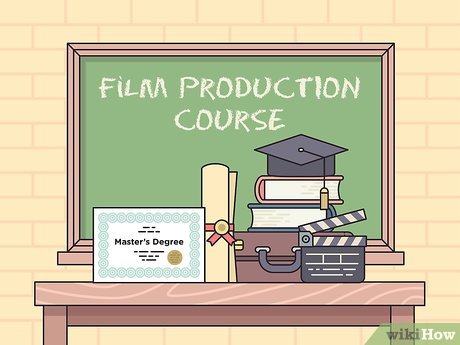How to Become a Film Producer
Part 1 of 3:
Building Skills for Film Production
-
 Develop your interpersonal skills so you can collaborate with others. Practice active listening by maintaining eye contact with the person speaking and nodding your head. Respond thoughtfully to what they said to show that you respect and care for them. Be more outgoing by striking up conversations with people you meet and showing genuine interest in what they're saying.[1]
Develop your interpersonal skills so you can collaborate with others. Practice active listening by maintaining eye contact with the person speaking and nodding your head. Respond thoughtfully to what they said to show that you respect and care for them. Be more outgoing by striking up conversations with people you meet and showing genuine interest in what they're saying.[1]- Film producers have to interact with crew members, actors, and studios, so it's important to maintain open communication with others.
- Introduce yourself to new people and talk with them to help you practice your skills.
- Try collaborating with other people on projects or short films so you can get used to communicating clearly so you can all meet an end goal.
-
 Practice multitasking to learn how to balance your duties. Write schedules and plan ahead of time so you don't get overwhelmed with what you need to complete. Make to-do lists and prioritize the most important tasks so they get done in a timely fashion. Try to group tasks that are similar to one another and complete them at the same time so you can maintain focus.[2]
Practice multitasking to learn how to balance your duties. Write schedules and plan ahead of time so you don't get overwhelmed with what you need to complete. Make to-do lists and prioritize the most important tasks so they get done in a timely fashion. Try to group tasks that are similar to one another and complete them at the same time so you can maintain focus.[2]- Film producers have many roles behind the scenes of a movie, and may work on multiple films at the same time.
- Do your best to avoid distractions since they can slow you down and get in the way of important tasks.
- Producers also need to delegate their duties to assistants and crew members, so accept that you can't do everything by yourself.
-
 Work on your negotiation skills so you can get the best deals. Set end goals that you hope to get out of the negotiation so you know the minimum amount you'll accept. Communicate clearly with the other person to tell them what you need and listen intently to them to understand what they're able to provide. If they can't meet your terms exactly, ask them if there's any way to compromise to show that you're flexible and willing to work with them.[3]
Work on your negotiation skills so you can get the best deals. Set end goals that you hope to get out of the negotiation so you know the minimum amount you'll accept. Communicate clearly with the other person to tell them what you need and listen intently to them to understand what they're able to provide. If they can't meet your terms exactly, ask them if there's any way to compromise to show that you're flexible and willing to work with them.[3]- Film producers need to work with a lot of financials, so negotiating with crew members and studios for the best rates is an important factor.
- Don't be afraid to turn an offer down if you aren't able to reach terms that work for you.
- Negotiation takes a lot of practice, so you may make mistakes with the first few deals you make.
- If you're able, hire a negotiation coach to help you. Coaches will act as a person you need to negotiate with so you can practice your skills.
-
 Learn how to make decisions quickly and diplomatically. Mentally work through the pros and cons of the choices you could make for each decision you need to make. Avoid letting your emotions or ego get in the way of your decision since you may not make the best choice if you do. Choose the option that's the most beneficial and makes the most sense for the task that you need to complete.[4]
Learn how to make decisions quickly and diplomatically. Mentally work through the pros and cons of the choices you could make for each decision you need to make. Avoid letting your emotions or ego get in the way of your decision since you may not make the best choice if you do. Choose the option that's the most beneficial and makes the most sense for the task that you need to complete.[4]- Producers are often asked a lot of pertinent questions that need to be answered in a fast and fair manner to stay on schedule.
- Don't make decisions impulsively without thinking over the options first.
- Ask other people for their input on a decision to help you get an outside perspective on your choice.
Tip: If you make a bad decision, take the blame for it and try to fix any problems right away to show that you're responsible for your own choices.
-
 Watch movies frequently to find out what projects are getting made. Stay up to date with movie-related news through websites or entertainment magazines to see what's currently in production. Check out what movies are coming out soon and watch as many as you're able to. Write down genres that are popular and what movies are doing well at the box office. Keep a list of movies that you like and are similar to projects that you want to work on.[5]
Watch movies frequently to find out what projects are getting made. Stay up to date with movie-related news through websites or entertainment magazines to see what's currently in production. Check out what movies are coming out soon and watch as many as you're able to. Write down genres that are popular and what movies are doing well at the box office. Keep a list of movies that you like and are similar to projects that you want to work on.[5]- Producers need to know what types of movies are successful and popular so they can find new films to produce next.
- Watch behind-the-scenes features on films you like to learn more about what goes into their production.
-
 Create your own short films to understand what goes into production. Work with friends or other people in the industry to write, shoot, and edit the short film to a final product. If you have a budget, base each of your decisions on what's the most cost-efficient so you don't overspend. When you're finished with the short, upload it online or submit it to film festivals to share it.[6]
Create your own short films to understand what goes into production. Work with friends or other people in the industry to write, shoot, and edit the short film to a final product. If you have a budget, base each of your decisions on what's the most cost-efficient so you don't overspend. When you're finished with the short, upload it online or submit it to film festivals to share it.[6]- Making your own short films helps you learn the process of producing a film from start to finish.
- Make sure you can easily shoot the film yourself. For example, it can be difficult to make something that relies on a lot of special effects since it can cost a lot of money.
- If you don't have an idea for a short film, ask friends or students in nearby film programs to see if you can help them with their projects.
Part 2 of 3:
Getting an Education
-
 Get a bachelor's degree in a production program at film school. Check for universities nearby that offer film programs, such as production, screenwriting, or cinematography. Try to take classes that focus on producing films, writing scripts, and assisting on a set so you can get used to the work environment. Focus on your coursework by taking notes and getting involved in your projects so you can earn the best grades.[7]
Get a bachelor's degree in a production program at film school. Check for universities nearby that offer film programs, such as production, screenwriting, or cinematography. Try to take classes that focus on producing films, writing scripts, and assisting on a set so you can get used to the work environment. Focus on your coursework by taking notes and getting involved in your projects so you can earn the best grades.[7]- You don't need to go to college to be a film producer, but it can help you make connections and learn more about the industry so you aren't overwhelmed later on.
- Join any film clubs or organizations available at your college so you can get involved and keep networking.
-
 Try for a master's degree in film production if you want to keep building skills. Apply for a master's program at a film school or university in a film-related degree. For example, you could find something specifically for production, or you could try screenwriting and cinematography to get more experience as a crew member. Focus on any assignments or projects you're assigned so you can develop film projects and learn more about what production entails.[8]
Try for a master's degree in film production if you want to keep building skills. Apply for a master's program at a film school or university in a film-related degree. For example, you could find something specifically for production, or you could try screenwriting and cinematography to get more experience as a crew member. Focus on any assignments or projects you're assigned so you can develop film projects and learn more about what production entails.[8]- You don't need a master's degree to get a job as a film producer.
-
 Take a business management class so you know how to handle finances. Many producers have to negotiate contracts and allocate film budgets, so learn how to spend your money wisely. Focus on any assignments you're given and practice budgeting so you know how to manage your money. Apply what you learn about managing a business to your knowledge of film production so you can learn how to provide enough money to fund a project.[9]
Take a business management class so you know how to handle finances. Many producers have to negotiate contracts and allocate film budgets, so learn how to spend your money wisely. Focus on any assignments you're given and practice budgeting so you know how to manage your money. Apply what you learn about managing a business to your knowledge of film production so you can learn how to provide enough money to fund a project.[9]- You can either take business courses while you're in college or you can find community and online classes if you aren't in school.
- Taking business courses can also help you if you plan on opening your own production company in the future.
-
 Sign up for screenwriting courses so you can recognize quality scripts. Many producers read scripts to find new content they want to make. Pay attention to the basics of script formatting and how to structure stories properly so you can recognize what could be successful. Practice writing your own scripts that you could possibly film and produce in the future.[10]
Sign up for screenwriting courses so you can recognize quality scripts. Many producers read scripts to find new content they want to make. Pay attention to the basics of script formatting and how to structure stories properly so you can recognize what could be successful. Practice writing your own scripts that you could possibly film and produce in the future.[10]- If you can't find screenwriting courses, you can also search for movie scripts online and read ones that are popular.
Tip: If you read a script that you like written by someone in your course, ask them if they want help producing it so you can work with them.
Part 3 of 3:
Breaking into the Film Industry
-
 Relocate to a city with a prominent film industry. Producers usually need to spend their time on film sets to make sure everything's running smoothly. If you're in North America, try moving to Los Angeles, New York, Atlanta, or Toronto for film production. Other cities around the world known for their film industry are London, Mumbai, Paris, and Hong Kong. Look for places to live that are within your budget so you can relocate without a lot of financial strain.[11]
Relocate to a city with a prominent film industry. Producers usually need to spend their time on film sets to make sure everything's running smoothly. If you're in North America, try moving to Los Angeles, New York, Atlanta, or Toronto for film production. Other cities around the world known for their film industry are London, Mumbai, Paris, and Hong Kong. Look for places to live that are within your budget so you can relocate without a lot of financial strain.[11]- You can also try finding independent filmmakers in your area if you aren't able to relocate.
-
 Start looking for production assistant roles to begin your career. Production assistants help others around the set by running errands, taking calls, and making sure everything runs smoothly. Look for positions at a production agency or studio, and submit your résumé when you find jobs you want. As you're on set, talk with the people you're working with to connect with them so you can develop a good repertoire with them.[12]
Start looking for production assistant roles to begin your career. Production assistants help others around the set by running errands, taking calls, and making sure everything runs smoothly. Look for positions at a production agency or studio, and submit your résumé when you find jobs you want. As you're on set, talk with the people you're working with to connect with them so you can develop a good repertoire with them.[12]- Some production assistants work on set while others work in an office. As you work longer, you may get additional duties and responsibilities.
- Try to apply to studios that are making content you enjoy watching and making so you enjoy your time working.
-
 Get used to working long hours. Producers are usually the first people on set and the last people to leave, so you may work for over 12 hours a day depending on the size of the project. You may also need to work nights, weekends, and holidays to complete shoots, so make sure you're comfortable with working during that time. Make sure you get enough rest when you aren't working so you can stay alert for the next day's shoots.[13]
Get used to working long hours. Producers are usually the first people on set and the last people to leave, so you may work for over 12 hours a day depending on the size of the project. You may also need to work nights, weekends, and holidays to complete shoots, so make sure you're comfortable with working during that time. Make sure you get enough rest when you aren't working so you can stay alert for the next day's shoots.[13]- Balancing personal and professional relationships can be difficult as a producer. Be sure to schedule some time to meet up with people so you don't get too overwhelmed by work.
-
 Network with other people in the industry to make connections and move up. Spend time with your supervisors and the crew members you work with and hold friendly conversations with them. Get to know the people you work with by asking them out for dinner or drinks so you can bond with them. Be kind and maintain contact with the people you meet since they may remember you and let you know of upcoming opportunities.[14]
Network with other people in the industry to make connections and move up. Spend time with your supervisors and the crew members you work with and hold friendly conversations with them. Get to know the people you work with by asking them out for dinner or drinks so you can bond with them. Be kind and maintain contact with the people you meet since they may remember you and let you know of upcoming opportunities.[14]- Use websites like LinkedIn or Backstage to connect with other film professionals and expand your network.
Warning: Don't burn any bridges with people since they could say you're difficult to work with and make it hard for you to find future projects.
-
 Fund independent projects that you're passionate about, if you're able. If you find a filmmaker that you like and want to work with, ask them to coffee or lunch and discuss projects with them. Let them know that you want to help with their next production and find out what they need. If you have extra money, offer to help them out so you can see the project get completed. Otherwise, you can ask if there are other ways you can assist them.[15]
Fund independent projects that you're passionate about, if you're able. If you find a filmmaker that you like and want to work with, ask them to coffee or lunch and discuss projects with them. Let them know that you want to help with their next production and find out what they need. If you have extra money, offer to help them out so you can see the project get completed. Otherwise, you can ask if there are other ways you can assist them.[15]- Don't get involved with projects that you aren't passionate about since you may get tired of working with them if it's a long shoot.
Share by
Kareem Winters
Update 24 March 2020
You should read it
- ★ What would movies look like without special effects?
- ★ 10 life sentences in the movie 'Judge'
- ★ How to Make a Stop Motion Film in Windows Movie Maker
- ★ Joker film won the most prestigious award Venice Film Festival, may compete for an Oscar?
- ★ All you need to know about film photography, an artistic hobby














